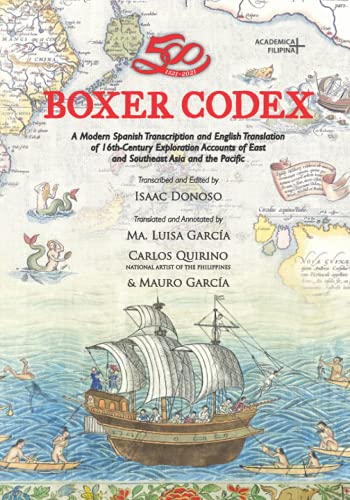All Categories



Boxer Codex: A Modern Spanish Transcription and English Translation of 16th-Century Exploration Accounts of East and Southeast Asia and the Pacific (Academica Filipina+)
Share Tweet
Get it between 2024-12-19 to 2024-12-26. Additional 3 business days for provincial shipping.
*Price and Stocks may change without prior notice
*Packaging of actual item may differ from photo shown
- Electrical items MAY be 110 volts.
- 7 Day Return Policy
- All products are genuine and original
- Cash On Delivery/Cash Upon Pickup Available








About Boxer Codex: A Modern Spanish Transcription And
In 1947, colonial Iberian maritime scholar Professor Charles R. Boxer acquired a late sixteenth-century manuscript written by an anonymous scribe who had compiled several eyewitness accounts of both Spanish and Portuguese expeditions to Asia and the Pacific. Through detailed descriptions and lavish illustrations, this manuscript depicted the customs, costumes, and ways of life of the various peoples of East and Southeast Asia, particularly the Philippine Islands. In the decades since the book came to light, an international constellation of scholars the world over has expanded our understanding of this valuable document and given us the clearest depiction of the lives of newly colonized Filipinos and the politics of early modern Asia. As such, the Boxer Codex is indispensable in understanding both Iberian and Asian encounters at a pivotal time in world history. Now this invaluable work is made accessible to a new generation of Filipinos and scholars with this bilingual edition, written in modern Spanish and English. It also marks the beginning of the commemoration of 500 years of Philippine-Spanish encounters from 1521 to 2021. An extensive introduction situates this work in a global context and presents the intertwined histories of academician Charles Boxer and Philippine National Artist Carlos Quirino, whose friendship ignited global interest and passionate study of the codex. Reviews "This book offers a rigorous bilingual edition of the Boxer Codex, an essential work for scholars. At the same time, it opens a great door for the average reader who is invited to enter into a fascinating compilation of stories and images of sixteenth-century East Asia and the Pacific that are full of enigmas, ethnological wealth, and delightful details." -Manuel Olle, Universitat Pompeu Fabra "No other single documentary source gathers more information about so many indigenous groups of Southeast Asia and the North Pacific during the early days of the Spanish colonization than the Boxer Codex. This treasure of firsthand accounts of detailed and revealing daily life is finally put in perspective, and introduced and annotated for 21st-century readers in its original Spanish along with an English translation. This edition is meant to last as a primary reference for contemporary scholars for many years to come." -Carlos Madrid, Director, Instituto Cervantes de Manila "El Códice Boxer configura un singular y animadísimo momento de la magnifica prosa y la intensa producción española o hispánica de ultramar. Por encima de los géneros del informe y la crónica, representa acaso uno de los mejores momentos de la vivacidad naturalista de una cultura expresiva abocada a la universalidad barroca. Se trata de una resolución entrañada ejemplarmente en una tradición, la del Arcipreste de Talavera, ahora deslumbrada ante los nuevos mundos y las posibilidades de una literatura ensayística de materia antropológica." -Pedro Aullón de Haro, Universidad de Alicante About the Editor Isaac Donoso holds a doctorate in Islamic studies and master's degrees in humanities and Hispanic philology from the University of Alicante in Spain. He also obtained master's degrees in Islamic studies from the University of the Philippines and in music from the University of La Rioja, Spain. In 2004 and 2008 he was awarded the research prize Ibn al-Abbar, the most important Spanish award for Islamic studies. His published works include Islamic Far East (2013), critical editions of Jose Rizal's prose works (2012) and his seminal novels Noli me tangere (2011) and El Filibusterismo (2021). He also edited the volumes More Hispanic than We Admit (2008), More Islamic than We Admit (2018), and Historia cultural de la lengua española en Filipinas: ayer y hoy (2012). He currently teaches at the University of Alicante.




 (1)
(1)












